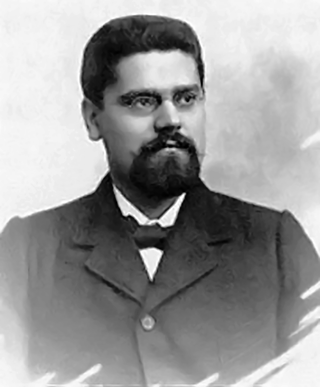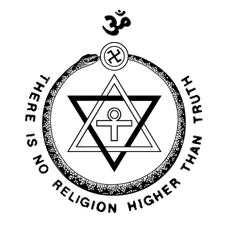Contents
| New Thought |
|---|
| Divinity |
| Beliefs |
| Activities |
| Glossary |
This is a glossary of terms used in New Thought .
| Part of a series of articles on |
| New Thought |
|---|
| New Thought |
|---|
| Divinity |
| Beliefs |
| Activities |
| Glossary |
This is a glossary of terms used in New Thought .
| Part of a series of articles on |
| New Thought |
|---|
Idealism in philosophy, also known as philosophical idealism or metaphysical idealism, is the set of metaphysical perspectives asserting that, most fundamentally, reality is equivalent to mind, spirit, or consciousness; that reality is entirely a mental construct; or that ideas are the highest type of reality or have the greatest claim to being considered "real". Because there are different types of idealism, it is difficult to define the term uniformly.

In many religious and philosophical traditions, the soul is the non-material essence of a person, which includes one's identity, personality, and memories, an immaterial aspect or essence of a living being that is believed to be able to survive physical death. The concept of the soul is generally applied to humans, although it can also be applied to other living or even non-living entities, as in animism.
Solipsism is the philosophical idea that only one's mind is sure to exist. As an epistemological position, solipsism holds that knowledge of anything outside one's own mind is unsure; the external world and other minds cannot be known and might not exist outside the mind.
The doctrine or theory of immanence holds that the divine encompasses or is manifested in the material world. It is held by some philosophical and metaphysical theories of divine presence. Immanence is usually applied in monotheistic, pantheistic, pandeistic, or panentheistic faiths to suggest that the spiritual world permeates the mundane. It is often contrasted with theories of transcendence, in which the divine is seen to be outside the material world.

Objective idealism is a philosophical theory that affirms the ideal and spiritual nature of the world and conceives of the idea of which the world is made as the objective and rational form in reality rather than as subjective content of the mind or mental representation. Objective idealism thus differs both from materialism, which holds that the external world is independent of cognizing minds and that mental processes and ideas are by-products of physical events, and from subjective idealism, which conceives of reality as totally dependent on the consciousness of the subject and therefore relative to the subject itself.
Ernest Shurtleff Holmes was an American New Thought writer, teacher, and leader. He was the founder of a spiritual movement known as Religious Science, part of the greater New Thought movement, whose spiritual philosophy is known as "The Science of Mind." He was the author of The Science of Mind and numerous other metaphysical books, and the founder of Science of Mind magazine, in continuous publication since 1927. His books remain in print, and the principles he taught as "Science of Mind" have inspired and influenced many generations of metaphysical students and teachers. Holmes had previously studied another New Thought teaching, Divine Science, and was an ordained Divine Science Minister. His influence beyond New Thought can be seen in the self-help movement.

The Religious Science movement, or Science of Mind, was established in 1926 by Ernest Holmes and is a spiritual, philosophical and metaphysical religious movement within the New Thought movement. In general, the term "Science of Mind" applies to the teachings, while the term "Religious Science" applies to the organizations. However, adherents often use the terms interchangeably.

Christopher Jacob Boström was a Swedish philosopher. His ideas dominated Swedish philosophy until the beginning of the twentieth century. He also had a great influence on Swedish cultural life.

Actual idealism is a form of idealism, developed by Giovanni Gentile, that grew into a "grounded" idealism, contrasting the transcendental idealism of Immanuel Kant, and the absolute idealism of G. W. F. Hegel. To Gentile, who considered himself the "philosopher of fascism" while simultaneously describing himself as liberal and socialist, actualism was presented the sole remedy to philosophically preserving free agency, by making the act of thinking self-creative and, therefore, without any contingency and not in the potency of any other fact.
In esoteric cosmology, a plane is conceived as a subtle state, level, or region of reality, each plane corresponding to some type, kind, or category of being.
The term involution has various meanings. In some instances it refers to a process prior to evolution which gives rise to the cosmos, in others it is an aspect of evolution, and in still others it is a process that follows the completion of evolution in the human form.

Integral yoga, sometimes also called supramental yoga, is the yoga-based philosophy and practice of Sri Aurobindo and The Mother. Central to Integral yoga is the idea that Spirit manifests itself in a process of involution, meanwhile forgetting its origins. The reverse process of evolution is driven toward a complete manifestation of spirit.
The New Thought movement is a new religious movement that coalesced in the United States in the early 19th century. New Thought was seen by its adherents as succeeding "ancient thought", accumulated wisdom and philosophy from a variety of origins, such as Ancient Greek, Roman, Egyptian, Chinese, Taoist, Hindu, and Buddhist cultures and their related belief systems, primarily regarding the interaction among thought, belief, consciousness in the human mind, and the effects of these within and beyond the human mind. Though no direct line of transmission is traceable, many adherents to New Thought in the 19th and 20th centuries claimed to be direct descendants of those systems.
This glossary of philosophy is a list of definitions of terms and concepts relevant to philosophy and related disciplines, including logic, ethics, and theology.
This is a glossary of spirituality-related terms. Spirituality is closely linked to religion.
Romantic epistemology emerged from the Romantic challenge to both the static, materialist views of the Enlightenment (Hobbes) and the contrary idealist stream (Hume) when it came to studying life. Romanticism needed to develop a new theory of knowledge that went beyond the method of inertial science, derived from the study of inert nature, to encompass vital nature. Samuel Taylor Coleridge was at the core of the development of the new approach, both in terms of art and the 'science of knowledge' itself (epistemology). Coleridge's ideas regarding the philosophy of science involved Romantic science in general, but Romantic medicine in particular, as it was essentially a philosophy of the science(s) of life.

Within the system of Theosophy, developed by occultist Helena Blavatsky and others since the second half of the 19th century, Theosophical mysticism draws upon various existing disciplines and mystical models, including Neo-platonism, Gnosticism, Western esotericism, Freemasonry, Hinduism and Buddhism.
Dualism in Indian philosophy is a belief, or large spectrum of beliefs, held by certain schools of Indian philosophy that reality is fundamentally composed of two parts or two types of existence. This mainly takes the form of either mind-matter dualism, as in some strands of Buddhist philosophy, or consciousness-nonconsciousness dualism in the Samkhya and Yoga schools of Hindu philosophy. These can be compared and contrasted with mind-body dualism in Western philosophy of mind and metaphysics.

Muhammad Iqbal was a prolific writer who authored many works covering various fields and genres such as poetry, philosophy and mysticism. His philosophical writings and poetical works had a notable impression on the religio-cultural and social revival of the East particularly subcontinent Muslim. The central theme of his philosophical thought throughout his works, prose and poetry, especially in The Secrets of the Self,The Secrets of Selflessness and Message from the East is the Doctrine of Khudi. As a Muslim sage he realized that the revival of man both as an individual and as a member of social group can only come from the ultimate central principle of his being, namely, the Self or Khudi. His knowledge convinced him that the decadent condition of Muslims was due to those philosophical systems which regard the world as a mere illusion not worth striving for, and to certain classes of Sufis who regarded self-annihilation as the highest goal of human life. He use of term Khudi is synonymous with the world of Ruh as mentioned in the Quran. To him the main purpose of the Quran is to awaken in man "the higher consciousness of his manifold relations with Allah and the universe". In his opinion the undeveloped condition and the miserable plight of the Muslim nations were due to lost real identity of Khudi and to keep distance from the true spirit of Islam. Iqbal's ideal for individual as well as social life is Self-affirmation not Self-negation which was the common teaching of Hindu intellectualism and Sufi pantheism. Hence Iqbal tried to establish a firm theoretical foundation for his viewpoints, and to discover a proper philosophical terminology for conveying his message to all the humanity. To Iqbal Khudi is a universal and comprehensive reality with different degrees in expression, which moves perfection. Various factors and principles-which are mostly the same positive and negative religio-moral qualities can strengthen or weaken Khudi in human beings until it reaches the highest stage of perfection, that is, Vicegerency of God on earth. Iqbal, therefore, condemned the doctrine of dissolution of the human self into the featureless Absolute as an Ideal of inaction and poverty of life, and developed his own doctrine based on self-affirmation under the unique name of Khudi. According to him:

Romantic psychology was an intellectual movement that emerged in the late 18th and early 19th centuries in Europe, particularly in Germany. It was a response to the Enlightenment's emphasis on reason and rationality, which Romantic psychologists believed neglected the importance of emotions, imagination, and intuition in human experience.